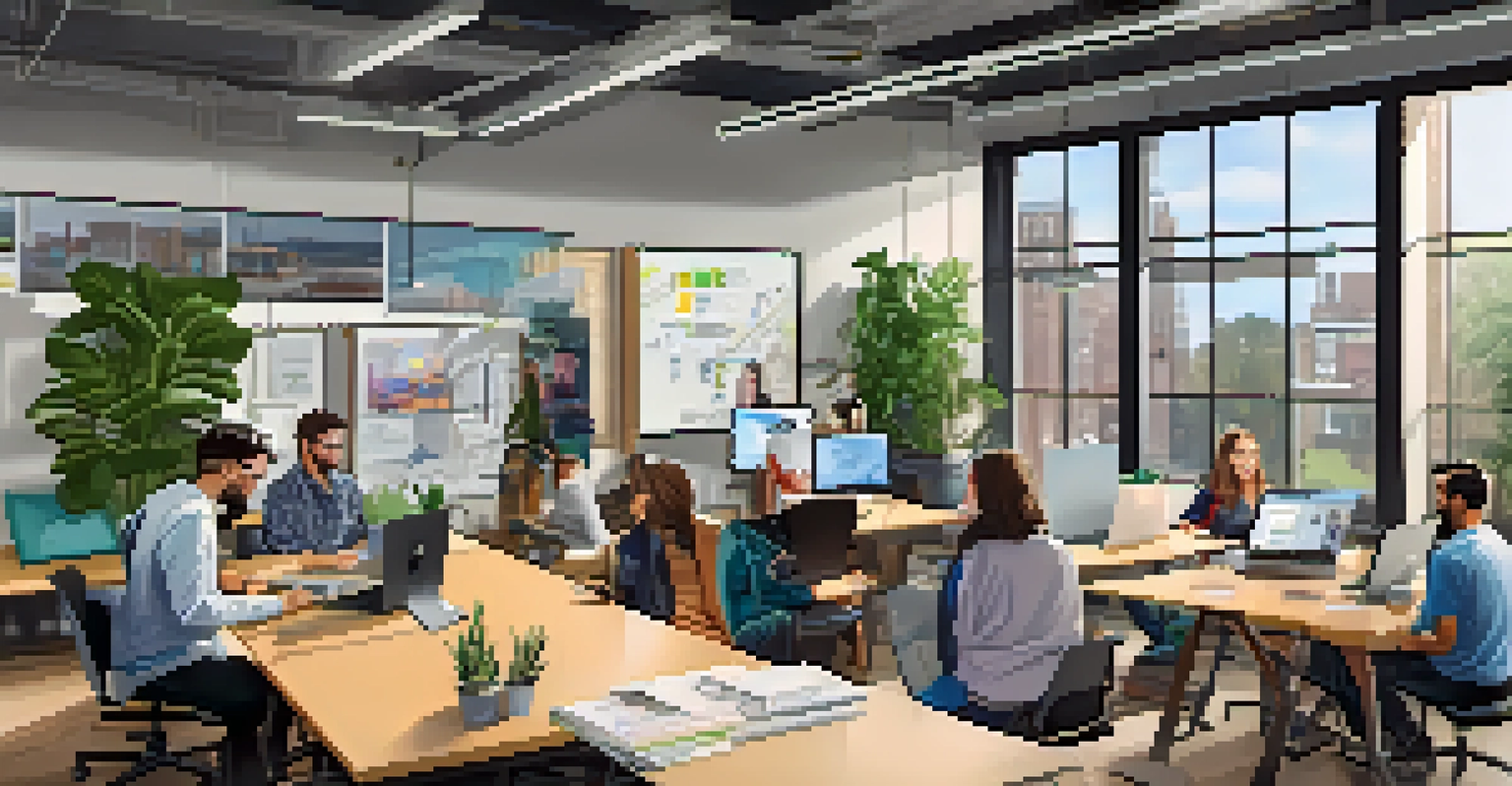Rochester's Economic Transformation: From Factories to Tech Hubs

The Industrial Legacy of Rochester: A Historical Overview
Rochester, New York, has a rich industrial heritage that dates back to the 19th century. Known for its booming factories, the city became a hub for manufacturing, particularly in optics and photonics. Companies like Eastman Kodak and Bausch & Lomb helped shape Rochester's identity and economy, providing thousands of jobs and fostering innovation.
Innovation distinguishes between a leader and a follower.
However, as the manufacturing sector began to decline in the late 20th century, Rochester faced significant economic challenges. Many factories closed their doors, leading to job losses and a shift in the community's landscape. This decline, though painful, set the stage for a new era of economic transformation that would redefine the city.
In response to these challenges, local leaders and entrepreneurs began to envision a new future for Rochester. They recognized the need to adapt and innovate, focusing on fostering a knowledge-based economy that would harness the skills of its talented workforce.
The Rise of the Tech Sector: Key Players and Innovations
As Rochester transitioned away from heavy manufacturing, the tech sector began to flourish. Companies like Paychex and Red Hat emerged as key players, bringing new jobs and opportunities to the region. This shift was characterized by a vibrant startup culture, with entrepreneurs leveraging technology to solve modern problems.

Local universities, such as the University of Rochester and Rochester Institute of Technology, became pivotal in this transformation. They provided research, development, and talent that fueled innovation in fields like software development, healthcare technology, and cybersecurity. The collaboration between academia and industry played a critical role in creating a robust tech ecosystem.
Rochester's Industrial Heritage
Rochester, New York, has a strong industrial past, primarily in manufacturing optics and photonics, which shaped its economy and identity.
Moreover, incubators and co-working spaces sprouted across the city, fostering collaboration among startups, freelancers, and established companies. This interconnected environment encouraged creativity and led to the birth of numerous tech-driven initiatives that continue to shape Rochester's economic landscape.
Investment in Education and Workforce Development
Recognizing that a skilled workforce is essential for economic growth, Rochester has prioritized education and training programs. Local institutions have adapted their curricula to meet the demands of the tech industry, ensuring that students are equipped with the necessary skills. This focus on education has led to a steady pipeline of talent ready to enter the workforce.
The best way to predict the future is to invent it.
Furthermore, partnerships between businesses and educational institutions have blossomed, providing students with hands-on experience through internships and co-ops. These initiatives help bridge the gap between theoretical knowledge and practical application, preparing graduates for successful careers in technology.
Community organizations have also played a role in workforce development by offering training programs for those looking to transition into tech careers. These efforts not only empower individuals but also strengthen the local economy by filling critical skill gaps in the labor market.
The Role of Innovation Districts in Economic Growth
Innovation districts have become a cornerstone of Rochester's economic transformation. These vibrant areas are designed to foster collaboration among businesses, researchers, and entrepreneurs, creating a dynamic environment for innovation. By clustering resources and talent, these districts have become hotbeds of creativity and productivity.
One notable example is the Rochester Innovation Zone, which aims to attract tech companies and researchers to work together on cutting-edge projects. This initiative not only enhances the local economy but also positions Rochester as a leader in technological advancements. The synergy created within these districts has led to groundbreaking discoveries and entrepreneurial ventures.
Tech Sector's Emergence
As manufacturing declined, Rochester's tech sector grew, driven by local universities and a vibrant startup culture.
Moreover, the establishment of innovation districts has attracted investment from both public and private sectors. As more companies recognize the benefits of being part of this collaborative ecosystem, Rochester's reputation as a tech hub continues to grow, further solidifying its economic transformation.
Community Engagement: The Heart of Rochester's Transformation
Community engagement has been a crucial element in Rochester's economic transformation. Local residents, businesses, and organizations have come together to support initiatives that promote economic growth and innovation. This collective effort has fostered a sense of pride and ownership among residents, making them active participants in the city's evolution.
Events such as hackathons, tech fairs, and community forums have encouraged dialogue and collaboration among diverse groups. These gatherings not only showcase local talent but also provide opportunities for networking and idea exchange, enriching the community's fabric. When people come together, they can spark new ideas that drive progress.
Moreover, community engagement has helped ensure that the benefits of economic transformation are shared equitably. Initiatives aimed at inclusivity and diversity have worked to create pathways for underrepresented groups, ensuring that everyone has a stake in the city's future. This collaborative spirit is what truly sets Rochester apart as it embraces its new identity.
Challenges Ahead: Navigating the New Economy
Despite the progress Rochester has made, challenges remain as the city navigates its new economy. The rapid pace of technological change can create disparities in access to training and resources, leaving some residents behind. Addressing these gaps will be crucial for ensuring that the benefits of economic transformation reach all members of the community.
Additionally, competition from other cities vying for tech talent and investment poses a significant challenge. Rochester must continue to innovate and adapt to remain attractive to businesses and skilled workers. This may involve enhancing infrastructure, improving quality of life, and promoting the city's unique strengths.
Community Engagement is Key
Active community participation has been essential in Rochester's transformation, fostering innovation and ensuring equitable economic benefits.
Ultimately, overcoming these challenges will require a collaborative approach, with local leaders, businesses, and residents working together. By fostering a culture of resilience and adaptability, Rochester can continue to thrive in the ever-evolving landscape of the tech economy.
Looking to the Future: A Vision for Rochester's Economy
As Rochester moves forward, its vision for the future is rooted in innovation, inclusivity, and sustainability. Local leaders are committed to building a tech-driven economy that not only thrives but also uplifts the community as a whole. This forward-thinking approach emphasizes the importance of harnessing technology to address pressing social and environmental challenges.
The growth of the tech sector presents opportunities for collaboration across various industries, creating a more diverse economic landscape. By investing in emerging technologies like artificial intelligence, renewable energy, and biotechnology, Rochester can position itself as a leader in these fields, attracting both talent and investment.

Moreover, fostering a culture of entrepreneurship will be key to sustaining economic growth. By supporting startups and encouraging innovation, Rochester can cultivate a vibrant ecosystem where new ideas can flourish. The city's commitment to its future will ultimately determine its success in navigating the ever-changing economic landscape.